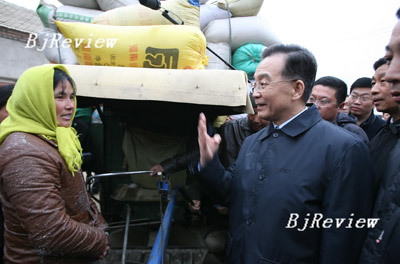|

Death Penalty Review
The Supreme People's Court will now review all death sentences passed by lower courts.
Preparations have progressed smoothly, and the court is "basically ready" to exercise the right to review and make final decisions on all death sentence cases in the country, Supreme People's Court President Xiao Yang said on December 28.
Three criminal tribunals have been set up as a supplement to the existing two, and the review team has been expanded, according to the court.
New members have been selected from local courts, law firms and law schools, and they have finished a three-month training program at the Supreme People's Court. They are currently on probation for a year before officially assuming office.
Each case will be reviewed by a team of three judges, who will check the facts, laws applied and criminal procedures adopted.
Education Blueprint
The Chinese Government will extend its nine-year compulsory education during the 11th Five-Year Plan (2006-10), according to a guideline approved in principle by the Central Government on December 27.
The priorities of education development set out in the guideline include providing comprehensive education, extending compulsory education in central and western regions, boosting vocational education and improving the quality of higher education.
More financial support will be given to underdeveloped, rural, border and ethnic regions, and the gap in educational resources and funds between regions and urban and rural areas will be narrowed, an executive meeting of the State Council presided over by Premier Wen Jiabao decided.
Measures will be taken to ensure the education of needy students and to solve education issues of public concern, while teacher training and school management will be improved.
Launch Pad Upgrade
A launch pad at a major satellite launch center in southwest China has been upgraded.
The upgrade will improve China's launch competitiveness in the international arena, said the spokesman of the Xichang Satellite Launch Center in Sichuan Province, which will launch China's first lunar-probing satellite in 2007.
In the next five years, the Xichang center will develop the capability to launch more than 10 satellites a year, the spokesman said.
New technologies such as remote control, a real-time three-dimensional display system and a low-temperature fuel concentration warning system were introduced to the upgraded launch tower, making it more advanced, highly automated and safer, the spokesman said.
Cross-strait Ties Highlighted
Chinese President Hu Jintao said in a New Year message that the Chinese mainland will actively promote exchanges and cooperation across the Taiwan Strait, safeguard peace and stability, and push ahead with peaceful reunification.
He called on Chinese people around the world to join hands to oppose "Taiwan independence" and to work for the ultimate reunification of the Chinese nation.
Hu made the speech at a New Year tea party held by the National Committee of the Chinese People's Political Consultative Conference, a top political advisory body composed of various political parties and people from all walks of life.
President Hu said that the mainland's Taiwan policy of "peaceful reunification" and "one country, two systems" will not change. In reiterating his four guiding principles regarding cross-strait relations, Hu said the mainland will strictly adhere to the one-China principle, continue efforts to seek peaceful reunification, always place its hopes on the Taiwanese people, and never compromise in the struggle against "Taiwan independence."
| 